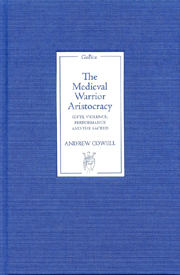Book contents
- Frontmatter
- Contents
- Acknowledgements
- Introduction
- 1 The Power of Giving
- 2 The Symbolic Constitution of the Giving Subject: William the Conqueror and Robert Guiscard
- 3 Violence and “Taking”: Towards a Generalized Symbolic Economy
- 4 Taking an Identity: The Poem of the Cid
- 5 The Sacred Kept
- 6 The Hero, Gratuity and Alterity: The Song Of Roland
- 7 The Supplemental Hero: Raoul of Cambrai
- 8 Female Integrity and Masculine Desires in The Nibelungenlied
- 9 Fractured Identities, and the Solution of Chivalry: William of Orange
- Conclusion: A New, Different Warrior Aristocracy
- Works Cited
- Index
1 - The Power of Giving
Published online by Cambridge University Press: 12 September 2012
- Frontmatter
- Contents
- Acknowledgements
- Introduction
- 1 The Power of Giving
- 2 The Symbolic Constitution of the Giving Subject: William the Conqueror and Robert Guiscard
- 3 Violence and “Taking”: Towards a Generalized Symbolic Economy
- 4 Taking an Identity: The Poem of the Cid
- 5 The Sacred Kept
- 6 The Hero, Gratuity and Alterity: The Song Of Roland
- 7 The Supplemental Hero: Raoul of Cambrai
- 8 Female Integrity and Masculine Desires in The Nibelungenlied
- 9 Fractured Identities, and the Solution of Chivalry: William of Orange
- Conclusion: A New, Different Warrior Aristocracy
- Works Cited
- Index
Summary
In the medieval French epic Girart de Vienne, the attested version of which has been dated to around 1180, a poor knight named Renier arrives at Charlemagne's court, and offers to serve the king so that he and his brother may win “honor and reward” (l. 681). Charlemagne is not willing to take the young men into his household, but does offer them a nice sum of money, lodging, and new suits of clothing – fine gifts indeed for poorly dressed, unknown strangers. By the rules of classical gift theory, the strangers should be required to accept such gifts, and to reciprocate at a later time. Additionally, bonds of solidarity should be established between the parties, thanks to Charlemagne's generous offer. But instead, Renier reacts angrily, stating that “n'ai song d'avoir, ne sui pas marcheant” (“I need no money, I am no merchant born”) (l. 695) and continues “einz mes ling-nage n'ala avoir querant” (“None of my line have longed for wealth before”) (l. 701). He says that if he owned the whole palace, he would simply give it away (ll. 697–9). The exchange is the first encounter in a relationship which, though temporarily patched up, will ultimately turn into catastrophic rebellion.
Why does Renier unequivocally reject the gift, especially in such angry words, and why does he feel that it is an insult, as Charlemagne apparently indeed intended? This scene seems to correspond to nothing in Marcel Mauss's famous depiction of gift-giving which forms the basis of classical theory.
- Type
- Chapter
- Information
- The Medieval Warrior AristocracyGifts, Violence, Performance, and the Sacred, pp. 15 - 36Publisher: Boydell & BrewerPrint publication year: 2007



